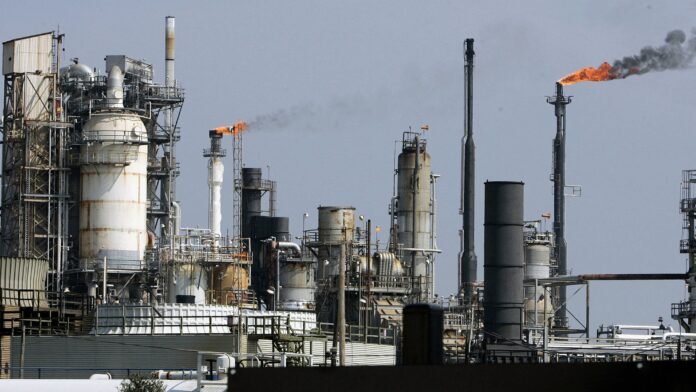LONDON/NEW YORK: Oil prices were largely steady on Wednesday as investors questioned the effectiveness of a US-led release of oil from strategic reserves and turned their focus to how producers will respond.
Brent crude was up 17 cents, or 0.2 percent, at $82.48 a barrel by 1605 GMT, while US West Texas Intermediate crude futures rose 7 cents, or 0.1 percent, to $78.56.
The US said it would release millions of barrels of oil from strategic reserves in coordination with China, India, South Korea, Japan and Britain to try to cool prices after OPEC+ ignored calls to pump more.
Japan will release “a few hundred thousand kiloliters” of oil from its national reserve, but timing has not been decided, its industry minister Koichi Hagiuda said on Wednesday.
China, the world’s largest crude importer, was noncommittal about its intentions to release oil from its reserves as requested by the US.
Some countries have not taken a helpful position in terms of oil and gas prices, the head of the International Energy Agency said on Wednesday, saying not enough supply was reaching consumers.
Analysts said the effect on prices was likely to be short-lived after years of declining investment and a strong global recovery from the COVID-19 pandemic.
The coordinated release could add about 70 million to 80 million barrels of crude supply, smaller than the more than 100 million barrels the market has been pricing in, analysts at Goldman Sachs said.
“On our pricing model, such a release would be worth less than $2 a barrel, significantly less than the $8 a barrel sell-off that occurred since late October,” the bank said in a note titled “a drop in the ocean.”
JP Morgan Global Commodities Research said any impact on oil prices from the release of crude may not be sustained for long. The brokerage also expects global oil demand to strengthen and surpass 2019 levels by March 2022.
Attention has now switched to how the Organization of the Petroleum Exporting Countries, Russia and their allies will react to the joint reserve release.
OPEC and its allies were not discussing for now pausing oil output increases, three sources said. The group is to hold two meetings next week to set policy, with a gathering on Dec. 1 for OPEC members only and another on Dec. 2 for OPEC+, two sources said.
Jeffrey Halley, a senior market analyst at OANDA, said the move to tap storage was “a one-shot wonder and markets responded appropriately.”
US crude stockpiles rose 1 million barrels last week, the Energy Information Administration said, compared with analysts’ expectations for a decrease of 481,000 barrels.
US crude stocks in the Strategic Petroleum Reserve fell last week to 604.5 million barrels, their lowest since June 2003.
Sign in
Welcome! Log into your account
Forgot your password? Get help
Password recovery
Recover your password
A password will be e-mailed to you.

